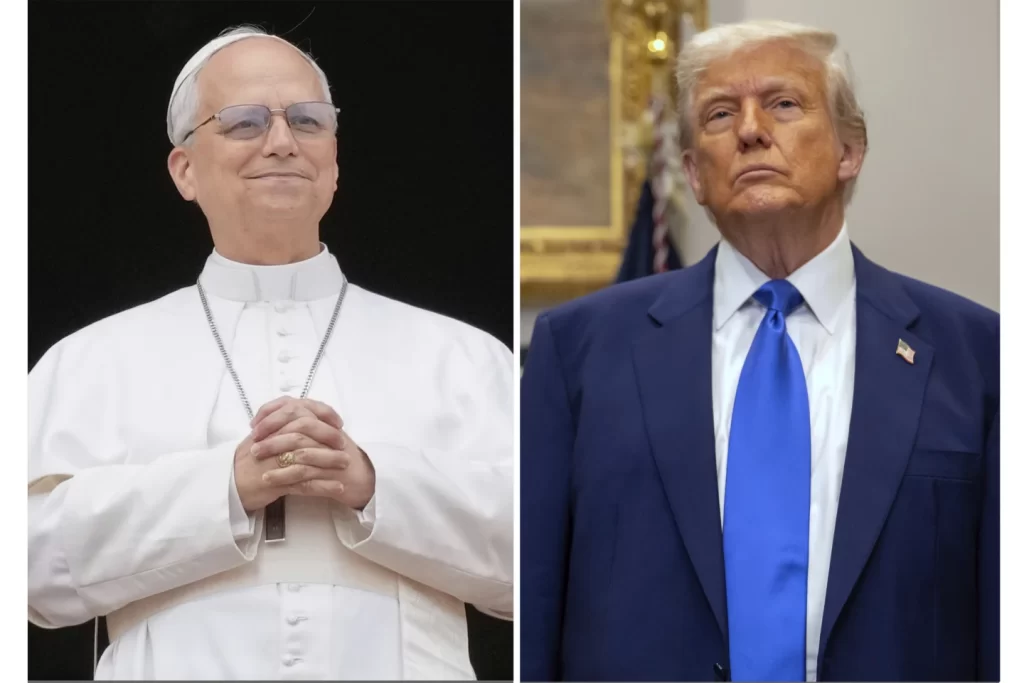
The motto of one newly elected American world leader: ” Fight! ” The other introduced himself to the world with his first public word as pope: “ Peace.”
The contrast between President Donald Trump and Chicago-born Pope Leo XIV couldn’t be more stark — politically, personally or in their world views. They lead in different roles and realms.
But Leo’s historic election last week to lead the world’s 1.4 billion Catholics as the first U.S.-born pope means that the two most powerful people on the planet are Americans. That raises questions about American influence at a time when Trump’s tariff wars and “one way or the other” threats have upended eight decades of global order and sparked distrust among allies toward the United States.
The prospect of too much American power in geopolitics is widely considered one reason that the Catholic Church had not elected an American to the papacy across the country’s nearly 250-year history. Until, that is, the former Cardinal Robert F. Prevost of Chicago — Pope Leo XIV — was chosen last week to be the 267th pontiff.
“The irony of Leo’s election is that many in the rest of the world will view it as a sign of hope — as an American who can speak for them rather than act against them,” said David Gibson, director of Fordham University’s Center on Religion and Culture.
Pope Leo is another kind of American on the world stage
The shock and delight of the not-well-known cardinal’s election soon shifted into robust discussion about how the top of the global pecking order could be populated by two Americans.
Trump is known to not enjoy sharing attention or primacy, as his “America first” foreign policy approach makes clear. American Catholics chose Trump over his Democratic rival, Kamala Harris.
In one apparent appeal to them, Trump posted an AI-generated image of himself dressed as a pope during the days of mourning for Pope Francis, who died April 21. The move was not appreciated by some Catholics and Italians. Trump denied posting the image himself and said anyone who was offended “can’t take a joke.” He insisted that “the Catholics loved it.” Even so, Trump wished Leo well and called it a “great honor” that the new pope was American.
Pope Leo, meanwhile, is in some senses a politician as well, with a calm manner and the approach of talking to his fellow cardinals in small groups before the conclave, they said. Though he was born in Chicago, Leo — then Prevost — spent two decades as a missionary in Peru before being appointed by Pope Francis in 2023 to lead the Vatican’s powerful office that vets bishops around the world.
He wouldn’t be the first pope to wade into world politics. Pope John Paul II, for example, is rightly credited with helping bring down communism. But Leo enters the papacy having already criticized Vice President JD Vance, the highest-profile Catholic in American politics, on social media. Leo is at odds with the administration on such policy issues as immigration — Trump’s signature issue — and the environment.
Like Trump, Leo has turned his attention to the media. On Monday in Vatican City, he called for the release of imprisoned journalists and affirmed the calling for “all of us to safeguard the precious gift of free speech and of the press.” In contrast, Trump’s approach to journalists has been combative, from the White House to the courts.
Trump and Pope Leo are in ‘different lanes’ as leaders
In early February, Leo — then still Prevost — shared an article from a Catholic publication with the headline, “JD Vance is wrong: Jesus doesn’t ask us to rank our love for others.”
It came days after Vance — a convert to Catholicism — discussed immigration in a Fox News interview by referencing a Christian tenet “that you love your family and then you love your neighbor, and then you love your community, and then you love your fellow citizens, and then after that, prioritize the rest of the world.”
Leo, speaking Italian to thousands gathered in St. Peter’s Square, described a different vision for the Church and human relations: “We have to be a church that works together to build bridges and to keep our arms open, like this very piazza, welcoming.”



